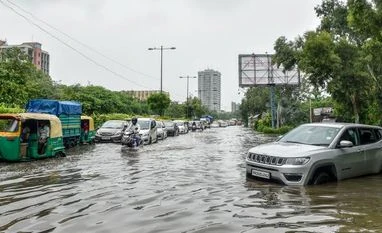Monsoon may have arrived late in Delhi, but it is inundating the capital now. The city has recorded 381 mm rainfall so far this month, the highest for July since 2003 and the second-highest ever.
The Safdarjung Observatory, which provides representative data for the city, recorded 100 mm rainfall in just three hours on Tuesday morning, according to the India Meteorological Department (IMD).
It is also the maximum rainfall in 24 hours in the month of July in eight years. In 2013, Delhi had received 123.4mm rainfall on July 21.
The capital has recorded 14 rainy days this month so far, despite the delayed arrival of the monsoon on July 13, 16 days behind schedule.
The monsoon, the most-delayed in 19 years, is now drenching Delhi, flooding low-lying areas and causing long traffic snarls.
According to IMD data, the Safdarjung Observatory has gauged 108 per cent excess rainfall so far 380.9 mm rainfall till July 27 against the normal of 183.5mm.
Also Read
Normally, Delhi records 210.6 mm precipitation in July.
The city had recorded 236.9 mm rainfall last year, 199.2 mm in 2019 and 286.2 mm in 2018.
It recorded 170.5 mm rainfall in 2017; 292.5 mm in 2016 and 235.2 mm in 2015.
In 2013, Delhi had received 340.5 mm rainfall. The all-time record is 632.2 mm precipitation in July, 2003, according to IMD data.
According to Mahesh Palawat, vice-president (meteorology), Skymet Weather, the number of rainy days has reduced over the last few years, and extreme weather events have increased.
"Cities are recording more rainfall in a shorter period of time. Earlier, 100 mm rainfall would occur over three to four days. Now, we have been receiving this much precipitation in just five-six hours, he said.
Such spells of rain do not help recharge groundwater and lead to flooding in low-lying areas, Palawat said.
The water percolates in the ground if it rains slowly over four to five days. In case of heavy falls, the rainwater runs off quickly, he said.
(Only the headline and picture of this report may have been reworked by the Business Standard staff; the rest of the content is auto-generated from a syndicated feed.)



)